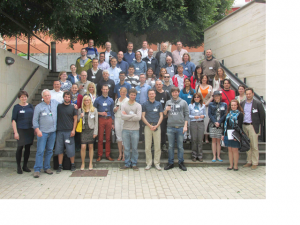The technological platform INSPIRA-1 is managed by CIB-CSIC and proposes as the main scientific and technological objective to develop biotechnological tools to improve the Spirulina by optimizing the biomass production for various industrial purposes. The first objective is to achieve more efficient, productive and nutritious cultures for its direct use as food and feed. The second objective is the industrial production of nutraceutical and pharmaceutical compounds from the microalgae, and the recovering of the resulting wastes to produce energy. The high multidisciplinary of the technology platform INSPIRA-1 also provides a suitable framework to achieve the training objective of the program oriented to a comprehensive education of new specialists. Finally, this technological platform opens the door to lead the field of spirulina at national and international levels, and by extension, in the future, the field of microalgae in general, giving technological support to the companies of the agribusiness, energy or environmental sectors currently operating at national or international level.
Role in INSpira-1
TILAMUR is dedicated to aquaponic and sustainable development strategy, capable of providing the best solutions to the problems of food insecurity and water scarcity to practice aquaculture and agriculture in arid areas such as the case of the Region Murcia. The use of this biotechnology and the use of renewable energies such as solar, thermal, wind, lay the foundation for the viability and profitability in aquaponic systems.
COST ACTIONS
COST Action FA1305, ‘The EU Aquaponics Hub’ is a timely intervention, which responds to the growth in aquaponics research and development in the EU and around the world.
Aquaponics is an innovative, sustainable food production system integrating aquaculture with hydroponic vegetal crops. Aquaponics has a key role to play in food provision and tackling global challenges such as water scarcity, food security, urbanization, and reductions in energy use and food miles. The EU acknowledges these challenges through its Common Agriculture Policy and policies on Water Protection, Climate Change, and Social Integration. A European approach is required in the globally emerging aquaponics research field building on the foundations of Europe’s status as a global centre of excellence and technological innovation in the domains of aquaculture and hydroponic horticulture.
The EU Aquaponics Hub’s aim is to the develop aquaponics in the EU, by leading the research agenda through the creation of a networking hub of expert research and industry scientists, engineers, economists, aquaculturists and horticulturalists, and contributing to the training of young aquaponic scientists. The EU Aquaponics Hub focuses on three primary systems in three settings:
1) ‘Cities and urban areas’ – urban agriculture aquaponics,
2) ‘Developing country systems’ – devising systems and technologies for food security for local people, and
3) ‘Industrial scale aquaponics’ – providing competitive systems delivering cost effective, healthy and sustainable local food in the EU.
.
info:
COST FA1305 Training School 4
Microbia-ponics : Microbial roles and dynamics in aquaponics
25–28 April 2016
University of Liège, Gembloux Agro-Bio Tech Faculty, Belgium
Background



